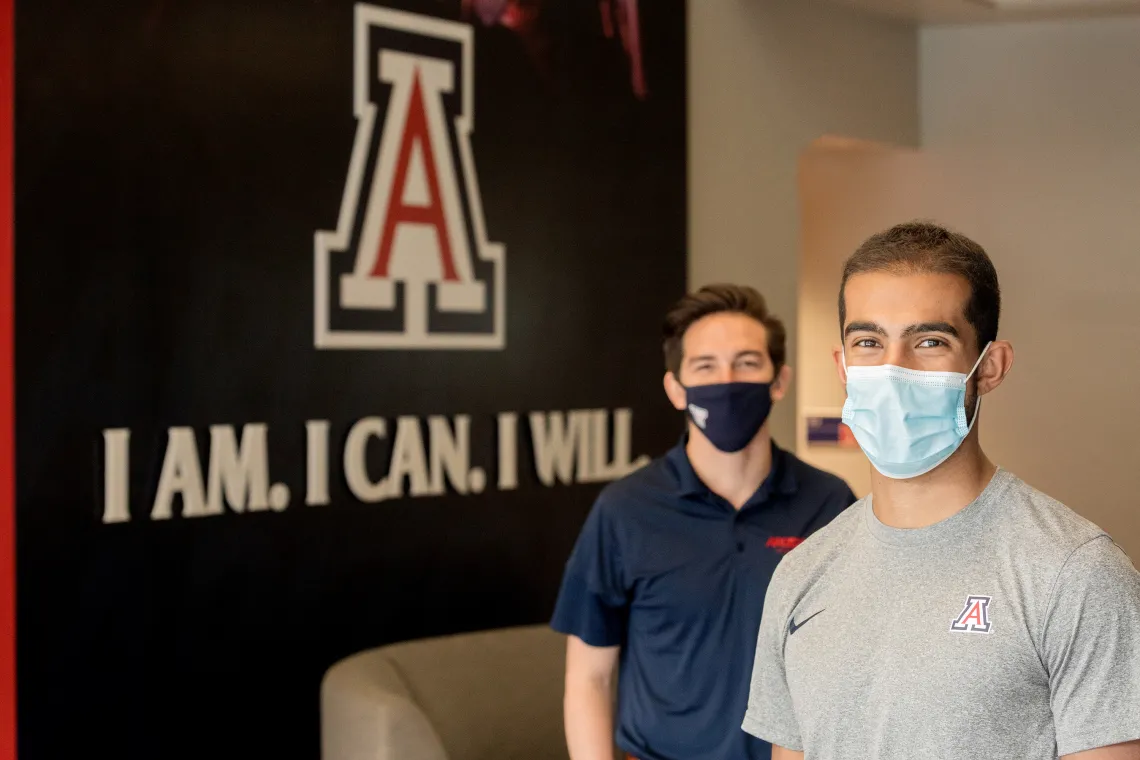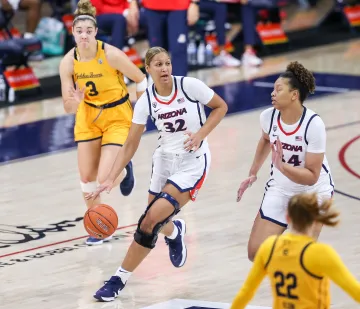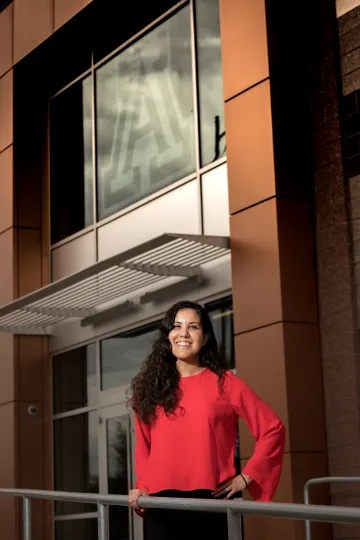C.A.T.S. Academics
Where athletic talent meets academic excellence

Academic counselor Max Krieger and Mo Almarhoun / Chris Richards photo
If you think student-athletes have a cushy gig, think again. Days typically begin with sunrise practice. Classes soak up the midday, and evenings are consumed by study. Not surprisingly, maintaining good grades in addition to a challenging daily regimen of practices is no small feat.
That’s where the University of Arizona’s C.A.T.S. Academics program comes in. Each year, this dedicated team of academic counselors, learning specialists and academic support part-time staff help hundreds of Wildcats excel both in class and on the field.
So phenomenal is C.A.T.S. (the name stands for “Commitment to an Athlete’s Total Success”) that its early-1990s inception set a new national standard. “The program was the first of its kind to provide a holistic experience for students,” says Marisol Quiroz ’01 ’04, C.A.T.S Academics director. “It was also an opportunity for the department to pull all of our student-athlete programs together, including student-athlete development, strength and conditioning, medical services, and clinical and sport psychology.”
C.A.T.S. Comes Through
For Mo Almarhoun, coming to UArizona was a leap of faith. He’d already been a decathlon champion and long jumper in his native Saudi Arabia, where he toured with the national team. Now he was a first-year recruit for UArizona Track and Field who still needed to learn English. He was preparing for a tough chemical engineering major — and counting on C.A.T.S. Academics to help him with both.

Lauren Ware / Mike Mattina photo
Today, Almarhoun is a senior who placed 10th in decathlon at the 2019 Pac-12 Championships and set a personal record with a dazzling 7.11 meter jump at an invitational in Iowa City, Iowa. Academically, he boasts a 3.5 GPA, and he credits C.A.T.S. for his success in a major he calls “insanely hard.”
“They are a huge help,” he says.
A peek at Almarhoun’s schedule reveals why. His day begins with 6 a.m. practice and ends with late-night study. “That’s my everyday routine,” he says. “It doesn’t change.”
Academic Rigors and the Coronavirus Pandemic
The pandemic raised concerns about maintaining the program’s history of success. But C.A.T.S. proved such fears unfounded, Quiroz says. “Despite challenges over the last year with remote learning, students are continuing to respond to the support system we have in place, and they’re continuing to be successful. We just had our best fall semester ever, with a 3.095 [average GPA among student-athletes]. So it wasn’t that we just sustained it. We actually improved it.”
While the pandemic creates special challenges — and puts the kibosh on many campus activities — Lauren Ware, a standout first-year women’s basketball player, sees a silver lining amid the disruption. “Obviously, as a freshman, you want that college experience,” says the 6-foot-5-inch forward and special education major, “and it’s kind of a bummer I missed out on that stuff. But in another way, it was nice because it eased me in. I don’t have to worry about walking to classes and trying to find everything. I’m able to just focus on the schoolwork.”

Marisol Quiroz / Chris Richards photo
Meanwhile, Ware is already preparing for life beyond college. Those plans include continuing to compete and teaching kids with learning disabilities. “Obviously, sports are going to come to an end at some point,” she says. “So, it’s important to focus on getting my education as well, because I’m going to need that degree to get a job and keep working.”
For Almarhoun, he’s had a chance to pause and ponder his future. “I was ready to go and perform,” he says, “but COVID stopped the whole thing. It was sad to take that break from competing when I was ready to jump. But at the same time, it has kind of made me take a step back and really realize what I want to do.”
Now, his long game involves returning to Saudi Arabia, where he’ll work as an engineer and compete on the national team again. In the near term, he’s decided to pursue a master’s degree in engineering management.
C.A.T.S. Continues to Grow
The C.A.T.S. Academics umbrella is growing; beginning with a handful of staff, the academics unit alone now includes 15 full-time and 70 part-time employees from across the UArizona campus. They range from academic counselors who guide students in their course selection and monitor NCAA eligibility as well as learning specialists who assist with study skill building strategies and specific assignments.
“As a freshman coming in, dealing with sports as well as academics, it’s hard to balance those things,” Ware says. “But the C.A.T.S. program does a really good job of helping you manage your time. They have specific tutors for whatever you need. They make sure you’re getting your work done and getting good grades.”
